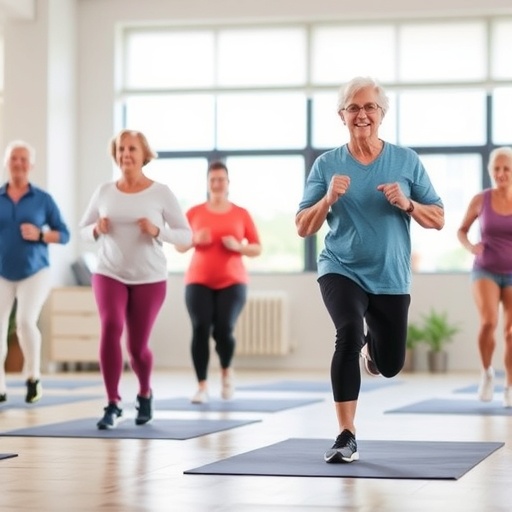A new study published in the European Geriatric Medicine journal has shed light on the profound effects of regular exercise on the health markers of older adults. The research, which is part of the comprehensive Korean National Aging Project, spans a 12-week period and examines the interplay between physical activity, inflammation, and functional health in the senior population. This investigation into the physiological changes associated with exercise underscores a growing understanding of how lifestyle adaptations can significantly enhance quality of life in aging individuals.
The primary focus of the research revolves around Meteorin-like protein, a molecule that has garnered attention for its potential role in regulating body functions such as inflammation and metabolic activities. It acts as an important signaling pathway regulator that may have significant implications for aging adults, particularly concerning their physical capabilities. The study explores how engaging in a structured exercise regimen can influence the levels of this protein in the bloodstream, suggesting a biological mechanism through which exercise may confer benefits.
Over the course of the study, participants engaged in a variety of exercises tailored to their abilities, which included strength training, aerobic exercises, and flexibility activities. The researchers meticulously documented the participants’ health changes, measuring inflammatory markers and assessing functional capacities before and after the 12-week program. This structured approach provided a robust data set to ascertain the efficacy of exercise on both biochemical and functional parameters.
Initial findings indicate that regular exercise markedly reduces inflammatory markers in older adults. This decrease in inflammation is particularly crucial as chronic inflammation has been linked to numerous age-related diseases, including cardiovascular diseases, arthritis, and neurodegenerative disorders. By highlighting this relationship, the study adds to the growing body of evidence that suggests exercise is not merely beneficial for physical fitness but is also a crucial factor in mitigating the risks associated with aging-related health decline.
Moreover, the statistical analysis revealed a direct correlation between the increased Meteorin-like levels and improvements in functional capacity among the participants. Functional capacity was assessed through various tests that measured mobility, strength, and endurance. Participants not only saw improvements in their ability to perform daily activities but also reported enhanced emotional well-being and social engagement, showcasing the holistic benefits of consistent physical activity.
This study also emphasizes the importance of sustaining an exercise routine, particularly in older adults who may face numerous physical and motivational barriers to activity. By implementing a planned and supported exercise strategy, many participants experienced significant incremental gains in their physical health. Such insights can inform healthcare practices and intervention strategies, ultimately encouraging older adults to adopt healthier lifestyles.
Additionally, the findings contribute to the broader discourse surrounding public health initiatives aimed at active aging. As populations around the world age, there is an urgent need for effective strategies that promote longevity and quality of life. The evidence presented in this study can serve as a cornerstone for developing community-based exercise programs that are accessible and appealing to older adults, thereby enhancing overall societal well-being.
The implications of this research extend beyond individual benefits, as healthy aging is a societal challenge that affects healthcare systems and economies globally. By fostering an environment that encourages physical activity among older adults, healthcare providers can alleviate some of the burdens associated with age-related diseases. The economic impact of improved health outcomes cannot be overstated, as healthier populations will demand less from healthcare resources over time.
One remarkable aspect of the research is its grounding in the Korean context, where cultural approaches to health and wellness can differ significantly. The study’s findings underscore the universal applicability of exercise as a remedy for age-associated ailments, while also recognizing the need for culturally tailored public health messages that resonate with older adults from diverse backgrounds. Continued research in varied cultural settings will further elucidate how exercise can be effectively integrated into the lives of seniors worldwide.
The study serves not only as a beacon of hope for aging individuals but also as a call to action for researchers, healthcare practitioners, and policymakers to prioritize physical activity initiatives. As we explore the connections between exercise and aging more deeply, it becomes evident that fostering a culture of exercise could substantially improve health outcomes for millions of people.
In conclusion, the groundbreaking findings from this Korean study on the effects of exercise in older adults present an encouraging narrative about the power of physical activity. It champions the idea that with consistent effort and dedication, profound changes in health markers associated with aging can be achieved. By emphasizing the biological benefits of exercise, specifically relating to Meteorin-like levels and inflammation reduction, this research ultimately provides a pathway for older adults to embrace an active lifestyle.
While the journey towards promoting better health in older populations is ongoing, the insights from this study will play a crucial role in shaping future research, community health programs, and individual practices. As we continue to uncover the layers of benefits that exercise has to offer, the narrative of healthy aging will evolve, giving hope and practical strategies to millions looking to enhance their golden years.
Subject of Research: Effects of exercise on Meteorin-like levels and inflammation in older adults.
Article Title: Effects of 12-week exercise on Meteorin-like levels, inflammation, and functional capacity in older adults: Korean national aging project randomized controlled study.
Article References:
Jamrasi, P., Bae, J.H. & Song, W. Effects of 12-week exercise on Meteorin-like levels, inflammation, and functional capacity in older adults: Korean national aging project randomized controlled study. Eur Geriatr Med (2025). https://doi.org/10.1007/s41999-025-01272-2
Image Credits: AI Generated
DOI:
Keywords: Aging, Exercise, Inflammation, Meteorin-like protein, Functional capacity, Public health.




